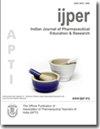在物理化学教学实践中应用动手探究学习提高教学质量
IF 0.8
4区 医学
Q3 EDUCATION, SCIENTIFIC DISCIPLINES
Indian Journal of Pharmaceutical Education and Research
Pub Date : 2023-10-04
DOI:10.5530/ijper.57.4.140
引用次数: 0
摘要
摘要:背景:物理化学是支撑医药事业发展的重要理论基础课。物理化学教学通常是一个传统教学和被动接受的过程。教学方法单一,学生缺乏自主学习的兴趣和能力。目的:探讨基于信息资源的翻转课堂教学、以学生为中心的微课堂辅助教学模式——融合自主学习的动手探究学习策略在物理化学课程中的应用,以提高学生的学习效果,培养学生的主动学习能力。材料与方法:选取实验药学专业2020级18名学生进行物理化学实践探究学习。采用形成性评价和总结性评价评价学生在主动学习目标方面的成就。研究完成后,进行了一次调查,以证明教学结果。结果:学生动手探究性学习成绩与期末成绩呈正相关。结果表明:2020级(实验组)学生综合成绩显著优于2019级(对照组)学生;特别是2020级学生的理论成绩更好,数据差异显著。问卷调查显示,大多数学生认为,动手探究学习策略与自主学习相结合,提高了他们的高水平认知技能,增强了他们的社会凝聚力和责任感。结论:本研究开发的动手探究性教学策略有效提高了学生形成性评价和结论性评价的成绩,为高等药学教育实施主动学习策略提供了参考依据和信息切入点。关键词:实践研究性学习;高等药学教育;主动学习;本文章由计算机程序翻译,如有差异,请以英文原文为准。
Applying Hands-on Inquiry Learning in Physical Chemistry Teaching Practice to Improve Teaching Quality
Abstract: Background: Physical chemistry is an important theoretical basic course that supports the development of medicine and pharmacies. Physical chemistry teaching is usually a process of traditional teaching and passive acceptance. The teaching method is singular, and students lack an interest and the ability of autonomous learning. Objectives: The purpose of the study is to explore the application of a hands-on inquiry learning strategy blending independent learning based on information resources flipped classroom teaching, the student-centered micro class auxiliary teaching mode in physical chemistry courses to improve student learning outcomes and develop active learning ability. Materials and Methods: Eighteen students in the experimental pharmacy major class, grade 2020, were recruited to study in a physical chemistry course that applies hands-on inquiry learning. Formative and summative evaluation were used to evaluate the students' achievements related to active learning goals. After the study was completed, a survey was administered to demongstrate the teaching results. Results: Student hands-on inquiry learning performance was positively correlated with the final scores. The results show that comprehensive scores of students of 2020 grade (experimental group) are significantly better than grade 2019 students (control group); in particular, the theoretical scores of 2020 grade students are better, and the data are significantly different. The questionnaire showed that most students believed that hands-on inquiry learning strategy blending independent learning improved their high-level cognitive skills and enhances their social cohesion and sense of responsibility. Conclusion: The hands-on inquiry teaching strategy developed in this study effectively improved students' performance in formative and summative assessment, and provided a reference basis and informative entry point for the implementation of active learning strategy in higher pharmaceutical education. Keywords: Hands-on inquiry learning, Higher pharmacy education, Active learning, Teaching strategy, Problem-based learning.
求助全文
通过发布文献求助,成功后即可免费获取论文全文。
去求助
来源期刊
CiteScore
1.40
自引率
0.00%
发文量
227
审稿时长
>12 weeks
期刊介绍:
The official journal of Association of Pharmaceutical Teachers of India (APTI) and is being published since 1967. IJPER, a quarterly publication devoted to publish reviews and research articles in pharmacy and the related disciplines of Pharmaceutical education. It mainly covers the articles of special interest, covering the areas of Pharmaceutical research, teaching and learning, laboratory innovations, education technology, curriculum design, examination reforms, training and other related issues. It encourages debates and discussions on the issues of vital importance to Pharmaceutical education and research. The goal of the journal is to provide the quality publications and publish most important research and review articles in the field of drug development and pharmaceutical education. It is circulated and referred by more than 6000 teachers, 40,000 students and over 1000 professionals working in Pharmaceutical industries, Regulatory departments, hospitals etc.

 求助内容:
求助内容: 应助结果提醒方式:
应助结果提醒方式:


